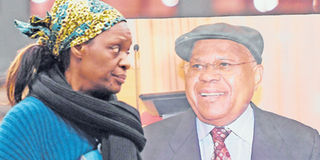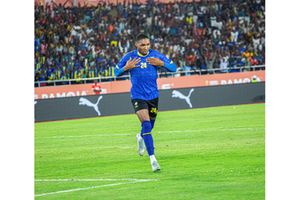PEOPLE IN THE NEWS : What next for DRC opposition?

Tshisekedi (right), who was 84, was the principal leader of the fragmented opposition in the vast, resource-rich central African country. PHOTO|FILE
What you need to know:
- This is Etienne Tshisekedi Mulumba, who until his death was the leader of Union for Democracy and Social Progress (UDPS), one of numerous opposition parties in DRC.
- In the last election, Kabila defeated Tshisekedi. While Kabila obtained 49 per cent of the total votes, Tshisekedi got 32 per cent. If it was not for fragmented opposition, Tshisekedi might have defeated Kabila.
Dar es Salaam. He was regarded as the pillar of the Democratic Republic of Congo (DRC)’s political system. His long time ambitions to become president of his country failed, and thus he became a formidable opposition figure. His death earlier in the week in Belgium, has left DRC opposition in a shambles, especially as it battles President Joseph Kabila’s plans to remain in power after exhausting his constitutional terms in office.
This is Etienne Tshisekedi Mulumba, who until his death was the leader of Union for Democracy and Social Progress (UDPS), one of numerous opposition parties in DRC.
In the last election, Kabila defeated Tshisekedi. While Kabila obtained 49 per cent of the total votes, Tshisekedi got 32 per cent. If it was not for fragmented opposition, Tshisekedi might have defeated Kabila.
Tshisekedi contested these results and he announced himself a winner. But, he never got a chance as Kabila continued to consolidate his leadership.
In recent days, however, Tshisekedi’s acumen in politics came in hand when opposition parties decided to join their forces against Mr Kabila’s plans to extend his stay in power. Tshisekedi died while the opposition enthusiasm against Kabila was gaining momentum. And because he is the rock of DRC opposition’s politics, it is obvious that the campaigns will take a serious dent.
Tshisekedi was born on December 14, 1932 and died on February 1, 2017 in Brussels, Belgium where he went for treatment. He was a Congolese politician and the leader of the main opposing political party in the DRC.
He started politics at a very tender age when he was still schooling. He served as an advisor to the first PMinister, Patrice Lumumba. He participated in almost all governments which lead Zaire (as it was called then before it changed its name into DRC) He also served as Prime Minister of the country on three brief occasions: in 1991, 1992–1993, and 1997.
Tshisekedi was the main Congolese opposition leader for decades. Although he served in the government of dictator Mobutu Sese Seko in various positions, he also led the campaign against Mobutu and was one of few politicians who challenged the dictator.
Tshisekedi and his UDPS party, boycotted the 2006 elections organised in Congo on claims that elections were fraudulent and were systematically rigged in advance. He was a candidate for President of Congo in the 2011 elections that many national and international observers, notably the Carter Centre, have said lacked credibility and transparency.
Having officially lost, Tshisekedi nevertheless declared himself the “elected president” of Congo. Policemen and Kabila’s presidential guards were subsequently stationed at every corner that gives entrance to Tshisekedi’s residence, placing him under unofficial house arrest.
Early life and education
He was born in Luluabourg, Belgian Congo (now called Kananga, Kasai-Occidental, Democratic Republic of the Congo) in 1932 to Alexis Mulumba and his wife Agnès Kabena.
Ethnically, he was a member of the Luba people. He attended primary school at Kabaluanda (West Kasai) and obtained a doctorate diploma in 1961 at the Lovanium University School of Law in Leopoldville (now Kinshasa); he was the first Congolese to ever get a doctorate diploma in law.
Politics
Tshisekedi’s career was intertwined with the political history of his country; Congo won independence in 1960 from Belgium.
After serving as advisor to Patrice Lumumba of the Mouvement National Congolais (MNC), Tshisekedi left to follow Albert Kalonji on his secessionist adventure in Kasai, acting as Minister of Justice in the newly autonomous State of South Kasai. As a result of the loss of tax revenues from the rich Katanga and South Kasai provinces, Lumumba’s government lost virtually all resources, and tried to suppress the secession.
In November 1965, Tshisekedi took part in the second Mobutu coup which led to the impeachment of President Kasavubu and his Premier Kimba.
Tshisekedi allegedly approved the execution of Kimba and his companions on the day of Pentecost, June 2, 1966.
He was a high-ranking member of the various governments formed by dictator Mobutu Sese Seko, who was president from 1965 to 1997. Tshisekedi helped amend the Congolese Constitution in 1967.
After the second coup of Mobutu, in 1965, Tshisekedi held ministerial positions. As such, Tshisekedi was instrumental in managing the country, allegedly based on the misappropriation of public funds and neutralisation of all opposition.
Tshisekedi remained in the Central Committee of the Popular Movement of the Revolution (Mouvement Populaire de la Revolution, MPR) until the early 1980s.
Opposition
Relations with Mobutu ruptured around 1980 and Tshisekedi was removed from Mobutu’s government. At that time, Tshisekedi formed the country’s first opposition party, the Union for Democracy and Social Progress (UDPS), to counter the ruling MPR. Tshisekedi thus became the main voice for opponents of the dictatorship, in the country that was then called Zaire. That status enabled him to mobilise public opinion and the international community, and he continued advocating for change during Mobutu’s tenure.
In 1980, Tshisekedi was thrown in prison for criticism of Mobutu’s repressive regime; he was imprisoned numerous times by Mobutu’s government.
In 1989, during Mobutu’s rule, several cases of his detention were described as unlawful by the United Nations Human Rights Committee.
On February 15, 1982, Tshisekedi co-founded the Union for Democracy and Social Progress (UDPS), which he continues to lead. The party remains popular in Congo’s capital Kinshasa, the two Kasai and Bas-Congo provinces as well as other provinces, with its main goal being a non-violent change to democratic rule.
According to Kapinga (Vice-President of the MPR), Mobutu kept a number of Congolese tribes happy through the “sharing of money” with the tribes’ power brokers. Under Mobutu’s regime, Aponet Potia (Secretary General of the MPR) tried delivering money to Tshisekedi in the middle of the night, but Tshisekedi refused it. Mobutu tried and failed on several occasions to persuade Tshisekedi to take the money.
Recent politics
In the run-up to the 2006 national elections, Tshisekedi decided to boycott the electoral process and the constitutional referendum because he believed they were rigged in advance.
Joseph Kabila won the presidential election. Tshisekedi considered the elections of 2006 to be a “masquerade” and claimed that Kabila’s election was decided in advance by influential people outside Congo. Kabila defeated Jean-Pierre Bemba, with Tshisekedi on the sidelines.
At a UDPS meeting in April 2009, the party indicated that it would participate in the 2011 election, and asked that Tshisekedi be their presidential candidate. He officially confirmed his candidacy in December 2010 at a congress of his party in Kinshasa, which was the first official party congress since the party formed in 1982.
Amidst rumours of serious health problems, Tshisekedi was flown to Belgium for treatment on 16 August 2014. Responding to the rumours about his condition, his party said that he was not seriously ill. On January 9, 2016, Tshisekedi, who was still in Brussels and apparently still ill, released a video message in which he vowed that he would “soon be among you so we can unite our efforts to win”.




